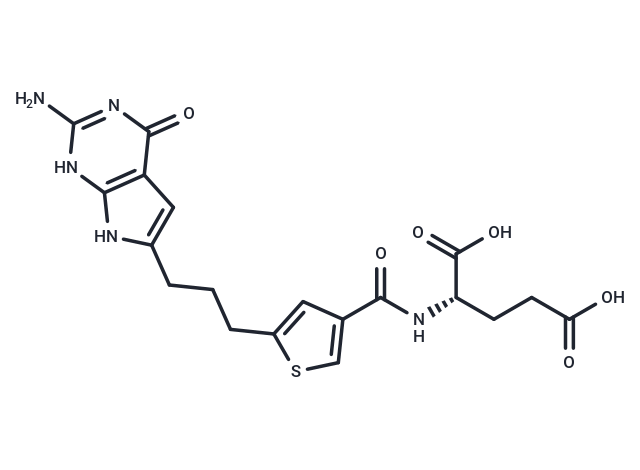
Antifolate C2
CAS No. 1286279-90-0
Antifolate C2( —— )
Catalog No. M34162 CAS No. 1286279-90-0
Antifolate C2 (AGF 154) has antitumor activity with an IC of 0.14 nM measured in a growth inhibition assay of human tumor cells.Antifolate C2 can be used for the study of cancer and autoimmune diseases.
Purity : >98% (HPLC)
 COA
COA
 Datasheet
Datasheet
 HNMR
HNMR
 HPLC
HPLC
 MSDS
MSDS
 Handing Instructions
Handing Instructions
| Size | Price / USD | Stock | Quantity |
| 5MG | 787 | In Stock |


|
| 10MG | 1074 | In Stock |


|
| 25MG | 1511 | In Stock |


|
| 50MG | 1841 | In Stock |


|
| 100MG | 2325 | In Stock |


|
| 200MG | Get Quote | In Stock |


|
| 500MG | Get Quote | In Stock |


|
| 1G | Get Quote | In Stock |


|
Biological Information
-
Product NameAntifolate C2
-
NoteResearch use only, not for human use.
-
Brief DescriptionAntifolate C2 (AGF 154) has antitumor activity with an IC of 0.14 nM measured in a growth inhibition assay of human tumor cells.Antifolate C2 can be used for the study of cancer and autoimmune diseases.
-
DescriptionAntifolate C2 (AGF 154) has antitumor activity with an IC of 0.14 nM measured in a growth inhibition assay of human tumor cells.Antifolate C2 can be used for the study of cancer and autoimmune diseases.
-
In Vitro——
-
In Vivo——
-
Synonyms——
-
PathwayOthers
-
TargetOther Targets
-
RecptorOthers
-
Research Area——
-
Indication——
Chemical Information
-
CAS Number1286279-90-0
-
Formula Weight447.46
-
Molecular FormulaC19H21N5O6S
-
Purity>98% (HPLC)
-
Solubility——
-
SMILESO=C1C2=C(NC(CCCC3=CC(C(N[C@@H](CCC(O)=O)C(O)=O)=O)=CS3)=C2)NC(N)=N1
-
Chemical Name——
Shipping & Storage Information
-
Storage(-20℃)
-
ShippingWith Ice Pack
-
Stability≥ 2 years
Reference
molnova catalog



related products
-
6-Methoxyeriodictyol...
5,7,3',4'-Tetrahydroxy-6-methoxyflavanone-7-glucoside (compound4) can be isolated from the Salvia plebeia R.Br.
-
Triphenyl bismuth
Triphenyl bismuth is an additive for making biomedical resins visible on x-ray images and can be used as a radiopaque agent for orthopaedic bone cements.
-
Ciproquazone
Ciproquazone has analgesic activity and is used to treat spondylitis.



 Cart
Cart
 sales@molnova.com
sales@molnova.com


